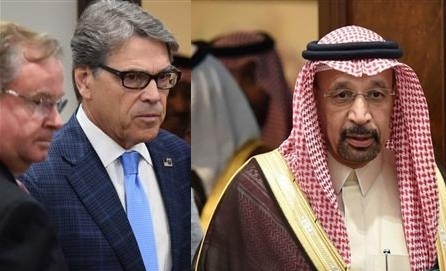
RNA - Bloomberg said in a report that three blue-chip lobbyists had filed disclosures saying they were advising the kingdom on the issue.
It named one of the companies as Pillsbury Winthrop Shaw Pittman which it said had announced in a Justice Department filing that it would be billing Saudi Arabia Ministry of Energy, Industry and Mineral Resources $890 per hour to give advice on a potential bilateral agreement with the US.
The second company was named as King and Spalding which Bloomberg said had announced in a February 21 filing with the Justice Department that it would be paid as much as $450,000 for an initial 30-day contract to lobby on behalf of the Saudis over its nuclear dream.
And in a third-such registration on February 20, David Kultgen, a lawyer and retired Saudi Arabian Oil Company executive, said he was recruited early last October to provide legal and consulting services to Saudi Arabia, including on its national atomic energy project, Bloomberg added.
The US is preparing to open talks with Saudi Arabia to secure a lucrative deal for the construction of nuclear reactors in the kingdom.
The talks were frozen under the former US administration after the Saudis refused to accept Washington’s non-proliferation “gold standard” – technically referred to as “123 agreement” – for civil nuclear cooperation deals.
Under President Donald Trump, however, the two sides have resumed discussing nuclear cooperation, despite Riyadh’s continued insistence on bypassing that standard.
Lawmakers and nonproliferation experts warn that without the gold standard, a deal to supply Saudi Arabia with nuclear power plants could allow spent fuel to be reprocessed into weapons-grade plutonium, Bloomberg reported.
According to Press TV, energy Secretary Rick Perry met with Saudi officials in London late last week to discuss the possible nuclear plant deal, even as the Trump administration reluctantly prepares to offer the Saudis an accord that falls short of a so-called "gold standard" prohibition on enriching and reprocessing of uranium that was embedded in a nuclear-sharing agreement with the United Arab Emirates a decade ago.
At least one other such "123 agreement" to share nuclear technology - named after a section of the US Atomic Energy Act - contains similar prohibitions, but more than a dozen others fall short of that "gold standard."
Supporters of a nuclear plant agreement are girding for a fight. Even if the Trump administration agrees to share nuclear technology with Saudi Arabia, the deal faces bipartisan criticism in Congress. Federal law requires congressional approval of and consultation over any 123 agreements laying out the framework for nuclear cooperation, with a special role reserved for the House Committee on Foreign Affairs and the Senate Committee on Foreign Relations.
847/940